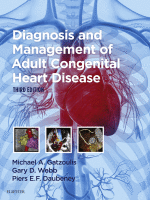Physical Address
304 North Cardinal St.
Dorchester Center, MA 02124

The great successes of congenital heart surgery have created a new class of cardiology patient: the adult with congenital heart disease (CHD). It is estimated that there are nearly three million patients older than 18 years of age with CHD…

Increasingly, more patients with congenital heart disease (CHD), including those with more complex disease, survive into adulthood. They present to critical care physicians by virtue of their underlying cardiac disease, following surgical or cardiologic intervention to replace failing valves and…

Every year, 4% of the population undergoes major surgery, defined as an intervention occurring in a hospital operating theater and usually requiring anesthesia for pain control. Worldwide, the mortality rate in noncardiac surgery is 0.8% to 1.5%, and complications occur…

Many patients who survive into adulthood with congenital heart disease (CHD) will develop progressive cardiopulmonary dysfunction. Some will develop ventricular failure, some will have pulmonary hypertension, and many will experience progressive cyanosis. Among these patients, some will require cardiac replacement,…

The univentricular heart encompasses a spectrum of rare and complex congenital cardiac malformations whereby both atria predominantly egress into one functionally single ventricular chamber, precluding biventricular repair. Population studies indicate an overall prevalence of approximately 2 per 10,000 live births.…

Venous shunts are surgical reconstructions involving an anastomosis between one or both venae cavae to one or both pulmonary arteries (PAs), and were developed to palliate infants born without two ventricular chambers. Staging venous shunts are typically performed during infancy…

The number of adult patients with congenital heart disease (CHD) is increasing due to improving outcomes after neonatal and infant surgery. Some 85% of neonates with CHD survive into adult life. The majority of adults with CHD require lifelong cardiologic…

Acknowledgment Dr. Horlick is supported by the Peter Munk Chair in Structural Heart Disease. Cardiac catheterization remains a fundamental modality for the diagnosis and interventional treatment of adult congenital heart disease (ACHD); however, there has been a noticeable change in…

Over the past few decades, advances in pediatric cardiology and cardiac surgery have revolutionized the prospect for patients with adult congenital heart disease (ACHD). Although cardiovascular magnetic resonance imaging (CMR) and transthoracic echocardiography (TTE) remain the techniques of choice for…

Cardiovascular magnetic resonance (CMR) gives unrestricted access to the heart and great vessels noninvasively and without ionizing radiation. It can provide biventricular functional assessment, flow measurement, myocardial viability assessment, angiography, and more, and is therefore recommended for long-term follow-up in…